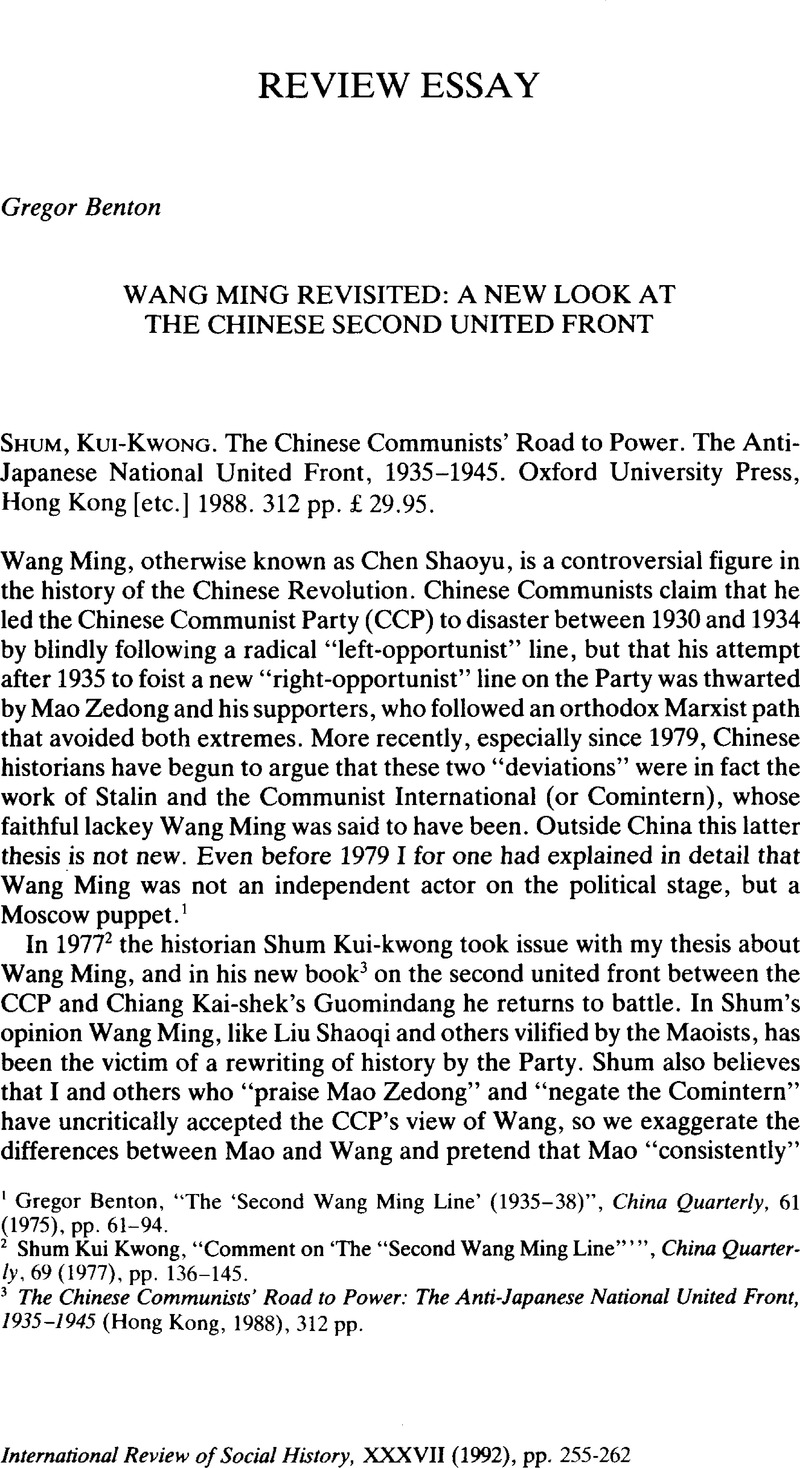Article contents
Wang Ming Revisited: A New Look at the Chinese Second United Front
Published online by Cambridge University Press: 18 December 2008
Abstract

- Type
- Review essay
- Information
- Copyright
- Copyright © Internationaal Instituut voor Sociale Geschiedenis 1992
References
1 Benton, Gregor, “The ‘Second Wang Ming Line’ (1935–1938)”. China Quarterly, 61 (1975), pp. 61–94.CrossRefGoogle Scholar
2 Kwong, Shum Kui, “Comment on ‘The “Second Wang Ming Line”‘”, China Quarterly, 69 (1977), pp. 136–145.CrossRefGoogle Scholar
3 The Chinese Communists' Road to Power: The Anti-Japanese National United Front, 1935–1945 (Hong Kong, 1988), 312 pp.Google Scholar
4 Benton, , “The ‘Second Wang Ming Line’”, p. 62.Google Scholar
5 Benton, , “The ‘;Second Wang Ming Line’”, p. 67.Google Scholar
6 Garver, John, “The Origins of the Second United Front: The Comintern and the Chinese Communist Party”, China Quarterly, 113 (1988), p. 31.CrossRefGoogle Scholar
7 Benton, , “The ‘Second Wang Ming Line’”, pp. 63–64.Google Scholar
8 Garver, , “The Origins”, p. 32.Google Scholar
9 Xiang Qing, “Gongchan guoji he Zhongguo gongchandang guanyu jianli kangRi minzu tongyi zhanxiande celüe” (“The Comintern and the CCP on setting up the anti-Japanese national united front”), Dangshi tongxun, 11–12 (1983), pp. 16–25, at p. 18; and Gongchan guoji he Zhongguo geming guanxide lishi gaishu (“Outline of relations between the Comintern and the Chinese Revolution”), Guangdong renmin chubanshe (1983), p. 143.
10 Garver, , “The Origins”, p. 34.Google Scholar
11 Qing, Xiang, “Outline”, pp. 143–144.Google Scholar
12 Luo, Chen, “Guanyu ‘bayi xuanyan’ chuxian yu guoneide shijian” (“The date of the arrival in China of the August First Declaration”), Dangshi ziliao congkan, 4 (1981), pp. 116–117.Google Scholar
13 Xiangping, Zhong, “Dierci guogong hezuode qianxianren” (“Go-between in the second Guomindang-CCP cooperation”), Dangshi tongxun, 3 (1986), p. 46.Google Scholar
14 Wenxian yu yanjiu, 3 (1985), p. 2.Google Scholar
15 Minxi'nan junzheng weiyuanhui fenhui, Yannanzhangde yanzhong jumian yu Li Hua tongzhide jihuizhuyi (The serious situation in Yannanzhang and Comrade Li Hua's opportunism). March 5, 1937. (Bureau of Investigations, Taibei, file 256.1, 813 7326.)
16 Benton, Gregor. Mountain Fires: The Red Army's Three- Year War in South China, 1934–1938 (Berkeley, 1992).Google Scholar
17 Garver, , “The Origins”, p. 59.Google Scholar
18 Xiaomin, Zhao et al., “Gongchan guoji he Zhongguo nongmin tudi douzheng” (“The Comintern and the Chinese peasants' land struggle”), Zhongguo xiandaishi yuekan, 7 (1985), pp. 41–42.Google Scholar
19 Fan-hsi, Wang, Chinese Revolutionary, Memoirs, 1919–1949, translated by Benton, Gregor (Oxford, 1980), p. 223;Google ScholarGarver, , “The Origins”, p. 69.Google Scholar
20 Kwong, Shum Kui, “Comment”, p. 142.Google Scholar
21 See Hanbing, Liang and Hongyun, Wei, Zhongguo xiandaishi dashiji (“Chronicle of contemporary Chinese history”) (Harbin, 1984), p. 176;Google Scholar and Derong, Zheng et at., Zhongguo gongchandang lishi jiangyi (“Talks on CCP history”), Jilin renmin chubanshe (1984), pp. 230–231.Google Scholar
22 K. Shevelyoff, “The Communist International on the Transition to Socialism in China” (unpublished paper).
23 Bishi, Ren, “Zhongguo kangRi zhanzhengde xingshi yu Zhongguo gongchandangde gongzuo he renwu” (“China's resistance and the CCP's work and tasks”) (04 14, 1938), and “Gongchan guoji chiweihui zhuxituan guanyu Zhonggong daibiao baogaode jueyian” (“ECCI Resolution on the Chinese delegate's report”) (07 1938),Google ScholarWenxian yu yanjiu, 4 (1985), pp. 22–35.Google Scholar
24 “Zedong, Xuexi Mao” (“Learn from Mao Zedong”), in Wang Ming xuanji (“Wang Mings Selected Works”) (Tokyo, 1971–1975), 5 vols, vol. 5, pp. 322–323.Google Scholar
25 Chen, , Yung-fa, , Making Revolution: The Communist Movement in Eastern and Central China, 1937–1945 (Berkeley, 1986).Google Scholar
- 1
- Cited by


